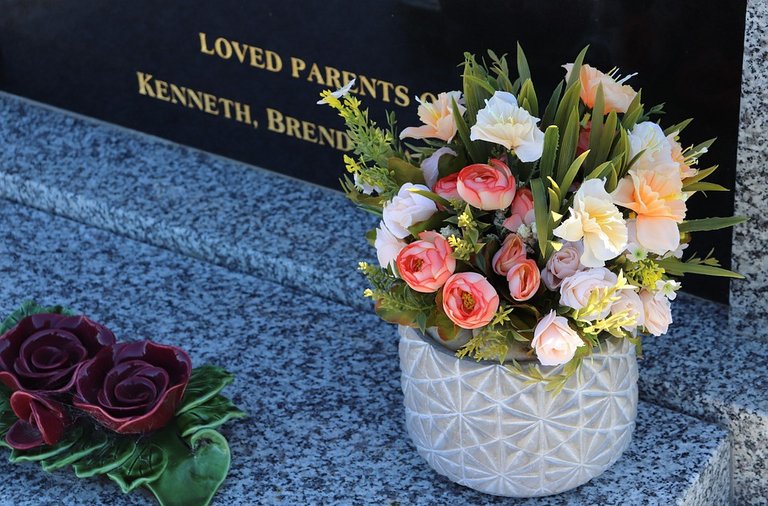
La muerte no existe,
la gente solo muere cuando la olvidan.
Si puedes recordarme, siempre estaré contigo.
Death doesn't exist,
people only die when they forget it.
If you can remember me, I will always be with you.
(Isabel Allende)
Alexas_Fotos - Imagen principal en Pixabay │ Alexas_Fotos - Main source in Pixabay

Hay temas en la vida que son difíciles de abordar. Sobre todo, más aún, cuando se trata de nuestros hijos. La edad, en apariencia, es un factor importante en este tipo de temática a la hora de conversarla.
Así como existe la vida, a ella está irremediablemente anclada la muerte. Un tema espinoso y que por lo general, del cual no queremos hablar pero que en algunos casos, es ineludible y necesario en el momento que se presentan en el seno familiar este tipo de situaciones.
Dentro de la inocencia de nuestros pequeños, existe muchas veces, un rango mejor manejado y más amplio en el abordaje de este tema en específico, es decir, que los niños pueden reaccionar de una manera más madura y mejor de la que esperábamos. Ellos suelen tener a veces mejor reacción que muchos adultos en este aspecto en si.
Aún así, y con la mayor pedagogía y tacto que podamos tener al respecto, sigue siendo un tema difícil de conversar, para el cual debemos encontrar la forma y las palabras idóneas, así como también la actitud que vamos a mostrar ante nuestros pequeños.
Cuando mi padre murió, en el año 2006, mi hijo Gabriel tan solo tenía seis años, estaba en realidad muy pequeño. Sin embargo, me sorprendió su capacidad (a tan corta edad), de manejar el dolor de una forma inocente pero a la vez, muy serena.
There are subjects in life that are difficult to deal with. Especially, even more so, when it comes to our children. Age is an important factor in this type of subject matter when it comes to discussing it.
Just as life exists, death is irremediably anchored to it. A thorny subject that generally, of which we do not want to speak but in some cases, it is inescapable and necessary at the moment that this type of situation appears in the family bosom.
Within the innocence of our children, there is often a better managed and wider range in addressing this specific issue, that is, children can react in a more mature and better way than we expected. They tend to have sometimes a better reaction than many adults in this aspect in itself.
Even so, and with the greatest pedagogy and tact that we can have in this regard, it is still a difficult subject to talk about, for which we must find the right way and the right words, as well as the attitude that we are going to show to our children.
When my father died in 2006, my son Gabriel was only six years old, very young indeed. However, I was surprised by his ability (at such a young age) to handle grief in an innocent but at the same time very serene way.

Dentro de su inocencia me preguntó si su abuelito Fernando, se había ido al cielo y lo iba a estar cuidando desde allá. Con lágrimas en los ojos le dije que su abuelito seguía estando con él y que siempre lo iba a seguir cuidando.
Siempre traté de fomentar en él, que recordara a su abuelito por los buenos momentos que muy a pesar del corto tiempo compartido, siempre iban a estar allí. Gabriel creció y a sus 22 años, recuerda a su abuelo con el amor y el orgullo más grande, lo cual me hace sentir, que lo manejé de la mejor manera posible a pesar de lo difícil del tema en cuestión.
Debemos hablarle a nuestros hijos del tema, con naturalidad y si es posible, sin tristeza en los ojos. La muerte es un tema con el que ellos van a tener que lidiar a lo largo de su vida y si toca decírselos cuando están pequeños por algún desafortunado evento familiar, es mejor hacerlo con naturalidad, resaltando y fomentando en ellos el amor que ese ser querido que se fue, va a seguir estando en sus recuerdos y en los afectos que condicionarán su vida y evolución.
Hay que hablarles en lenguaje sencillo y sobre todo, que no produzca en ellos confusión o en algunos casos, sentimientos de culpa. Sucede que puede darse el caso en que el niño por alguna casualidad haya sido altanero o se haya portado mal con la persona que murió y el niño, en su inocencia, pueda llegar a pensar que de alguna manera, pudieran haber tenido la culpa de que ese ser querido ya no esté más.
Debemos ser muy cariñosos y aunque estemos dándole una noticia dolorosa, ellos deben sentir el amor en nuestras palabras y la confianza de que todo va a estar bien después de ese doloroso evento. Eso sí, no debemos temer al hecho de pronunciar ante ellos, la palabra muerte o decirles que alguien de la familia, ha fallecido.
In his innocence, he asked me if his grandfather, Fernando, had gone to heaven and would be watching over him from there. With tears in my eyes, I told him that his grandfather was still with him and that he would always continue to take care of him.
I always tried to encourage him to remember his grandfather for the good times that despite the short time they shared, they would always be there. Gabriel grew up and at 22 years old, he remembers his grandfather with the greatest love and pride, which makes me feel that I handled it in the best possible way despite the difficulty of the subject in question.
We should talk to our children about it naturally and, if possible, without sadness in our eyes. Death is a subject that they will have to deal with throughout their lives and if it is necessary to tell them when they are young because of some unfortunate family event, it is better to do it naturally, highlighting and encouraging in them the love that the loved one who is gone will continue to be in their memories and in the affections that will condition their life and evolution.
It is necessary to speak to them in simple language and above all, not to produce in their confusion or some cases, feelings of guilt. It may happen that the child by some chance has been haughty or has behaved badly with the person who died and the child, in his innocence, may think that in some way, they may have been to blame for the fact that the loved one is no longer alive.
We must be very affectionate and even though we are giving them painful news, they must feel the love in our words and the confidence that everything will be all right after this painful event. Of course, we should not be afraid of pronouncing the word death before them or telling them that someone in the family has died.

etrustparts - Pixabay

A pesar de que debemos hablarles de este tema difícil, de forma delicada y muy cuidadosa, también es cierto que debemos hacerlo con la mayor sinceridad posible, sin ocultarles hechos que pudieran llevarlos a la confusión pues, lo que se busca es hablar con ellos y que tomen la noticia de la mejor forma que pueda haber.
Los niños muchas veces, tienen un sentido de entendimiento y aceptación de las cosas complicadas, de la mejor forma, llevándolas inclusive a su propio mundo y haciendo que sean menos dolorosas para ellos.
Debemos evitar en lo posible, que tengan impresiones o recuerdos dolorosos como por ejemplo, el momento del funeral, en el que, las emociones de los adultos, muchas veces están desbordadas y en momentos, son exageradas en cuanto a demostrar el dolor. Esto podría dejar en ellos, recuerdos que pueden llegar a ser traumatizantes y que para nada los ayudarán en la asimilación y comprensión del doloroso momento de la partida de un ser querido.
Los niños entienden el sentido de la muerte de otra manera distinta, lo cual puede alimentar en ellos, hechos de fantasía en los que pueden pensar que la situación del fallecimiento del ser querido, pueda ser temporal.
Sin embargo, de parte de nosotros los adultos está, el hacerles entender de la mejor manera posible, que más allá de que el ser querido ya no vaya a estar más con ellos, siempre estarán los recuerdos de los momentos que el niño vivió junto a esa persona. Es una forma de prolongar el recuerdo de la persona amada en el niño y no alimentar percepciones que puedan ser erradas para luego caer en desilusiones o tristezas porque la persona realmente no regresó.
Although we must talk to them about this difficult subject in a delicate and very careful way, it is also true that we must do it as sincerely as possible, without hiding facts that could lead them to confusion, because what we are looking for is to talk to them and make them take the news in the best possible way.
Children often have a sense of understanding and acceptance of complicated things in the best way possible, even bringing them into their world and making them less painful for them.
We should avoid, as much as possible, that they have painful impressions or memories such as, for example, the time of the funeral, in which the emotions of adults are often overflowing and at times are exaggerated in terms of showing the pain. This could leave in them, memories that can become traumatizing, and that will not help them at all in the assimilation and understanding of the painful moment of the departure of a loved one.
Children understand the meaning of death in a different way, which can feed in them, fantasy events in which they may think that the situation of the death of a loved one may be temporary.
However, it is up to us, the adults, to make them understand in the best possible way, that even though the loved one will no longer be with them, there will always be memories of the moments that the child lived with that person. It is a way to prolong the memory of the loved one in the child and not to feed perceptions that may be mistaken and then fall into disappointment or sadness because the person did not return.

La muerte es un evento desagradable con el que siempre vamos a tener que convivir y por ende, nuestros hijos también. Es por ello que, debemos tomar la previsión de lograr que, el momento de comunicación con nuestros hijos respecto a este tema, sea de la mejor y más sencilla manera, una que no genere traumas y los haga entenderla, como un evento natural, que alguna vez ha de llegar a nuestras vidas.
Gracias por acompañarme en este rato de reflexión y conversación, acerca de un tema importante de la vida cotidiana de nuestros hijos y que debemos aprender a manejarla de la mejor manera ante ellos para garantizarles una vida emocionalmente estable que beneficiará su buen desarrollo y evolución.
Death is an unpleasant event that we will always have to live with and therefore, our children will have to live with it as well. That is why we must take the foresight to ensure that the moment of communication with our children regarding this subject, is the best and simplest way, one that does not generate traumas and makes them understand it as a natural event, that some time has to come to our lives.
Thank you for joining me in this time of reflection and conversation, about an important topic in the daily life of our children and that we must learn to handle it in the best way to guarantee them an emotionally stable life that will benefit their good development and evolution.

Solo vives una vez.
Pero si lo haces bien, es suficiente.
You only live once.
But if you do it right, that's enough.
(Mae West)

Gracias por tomarse un tiempo para esta lectura
Thank you for taking the time for this reading



Fuente en el blog de la comunidad @motherhood │ Source in the community blog @motherhood .
Puedes unirte en:
https://peakd.com/c/hive-165757/created


El avatar fue creado por mi con la aplicación Avatoon en Android Play Store │ The avatar was created by me with the Avatoon application in the Android Play Store

Los separadores son propiedad de la comunidad Motherhood. Su uso està autorizado para sus miembros │ The dividers are the property of the Motherhood community. Their use is authorized for its members.

Los separadores color púrpura son cortesía de ikasumanera para libre uso de los usuarios de HIVE │ The purple separators are courtesy of ikasumanera for free use by HIVE users.




~~~ embed:1591903197421260800 twitter metadata:MTE4ODg2NTg5fHxodHRwczovL3R3aXR0ZXIuY29tLzExODg4NjU4OS9zdGF0dXMvMTU5MTkwMzE5NzQyMTI2MDgwMHw= ~~~
The rewards earned on this comment will go directly to the people( @marybellrg, @sacra97 ) sharing the post on Twitter as long as they are registered with @poshtoken. Sign up at https://hiveposh.com.
Un tema muy importante, y que debemos abordar con total naturalidad, cómo mencionas en tus palabras.
La muerte es parte de la vida, y como afrontamos está como adultos, es lo que transmitimos a los pequeños. Que bueno mantener los mejores recuerdos en sus memorias constantemente. Siempre he creído que somos eternos hasta que nos olvidan. Por eso ame la frase inicial que elegiste.
Un abrazo fuerte 🤗
La muerte como bien sabemos, está anclada a la vida y viceversa, mi bella. Nada como hablarles a nuestros niños de este tema tan importante, con naturalidad y sin generar traumas. Muchísimas gracias por tu comentario y tu visita. La frase inicial también me encantó. Solo morimos cuando nos olvidan. Es así! Un abrazote de vuelta, hermosa! 😘🤗
Es un tema difícil y cada niño responde de manera diferente. Mientras mis hijos estuvieron pequeños ningun familiar murió, ha sido ya de adultos cuando les ha tocado despedir al otro mundo a los abuelos. Gracias por compartir. Que estés bien mi querida @marybellrg. Un fuerte abrazo desde Maracay.
Así es, querido amigo. Es un tema que cuesta a todas las edades pero en el que, muchas veces, nuestros hijos reaccionan y lo manejan mejor de lo que esperamos. Muchísimas gracias por visitarme y dejar tu comentario. Lo aprecio mucho! Un abrazo de vuelta! 🤗
Estoy de acuerdo contigo hay que hablar con la verdad y sobre la muerte a lo niños, sin embargo, esto tambien depende porque no se le debe dar noticias fuuertes y tan bruscoas porque como dices los niños ven la muerte de otra manera. Todo es a su debido tiempo.
Un abrazo hermanita @marybellrg
Aportando desde la experiencia misma, saber como abordar el tema dependerá de nuestra experiencia y relación familiar, también la edad del niño afecta la forma de explicarselo. Un abrazote mi bella @marybellrg